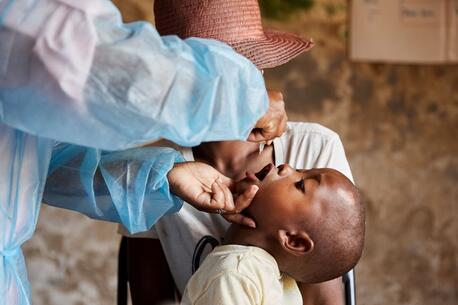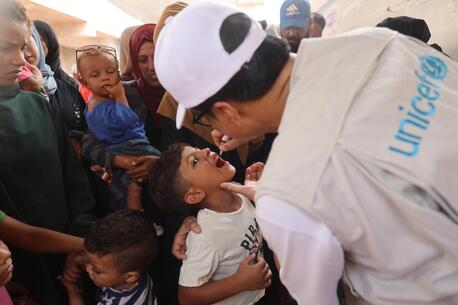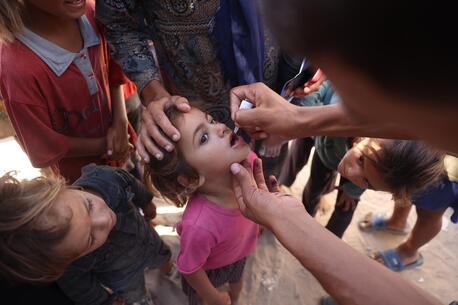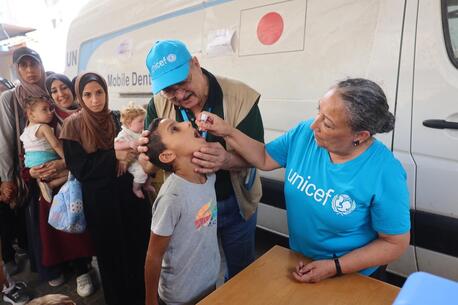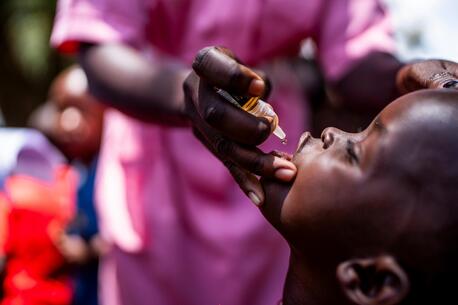
Polio
UNICEF helps vaccinate over 400 million of the world's children against polio each year — bringing the world ever closer to eradicating the virus. Yet children remain vulnerable, especially those in conflict and crisis. Learn more about what UNICEF is doing with partners to end polio and how to support those efforts.
UNICEF and the fight to end polio: on the brink of eradication
Polio, a highly infectious viral disease that primarily afflicts children under 5, is very close to being eradicated. But it is not gone.
Many countries and territories that were previously polio free are seeing their first cases in decades.
Committed to reaching every child in every country with the polio vaccine
Vaccinating every child is the key to ridding the world of polio for good. And thanks to global immunization efforts — one of modern medicine's greatest success stories — the prevalence of the disease has plummeted by over 99 percent since 1988.
And yet millions of children are still missing out on the polio vaccine, leaving them vulnerable to a disease that can cause paralysis or even death.
Children living in fragile settings — countries where conflict, natural disasters, humanitarian crises and other destabilizing factors make it difficult to deliver critical health care — are most at risk, accounting for the vast majority (85 percent) of those affected.
Polio cases in these settings have more than doubled between 2019 and 2024, according to UNICEF, while routine childhood immunization has dropped from 75 percent to 70 percent – well below the 95 percent needed for herd immunity.
UNICEF, a spearheading partner in the Global Polio Eradication Initiative* (GPEI), is committed to working with governments, communities and public and private partners to close immunization gaps and overcome other challenges so that every child can be protected from polio. When there's an outbreak, UNICEF often leads the emergency response.
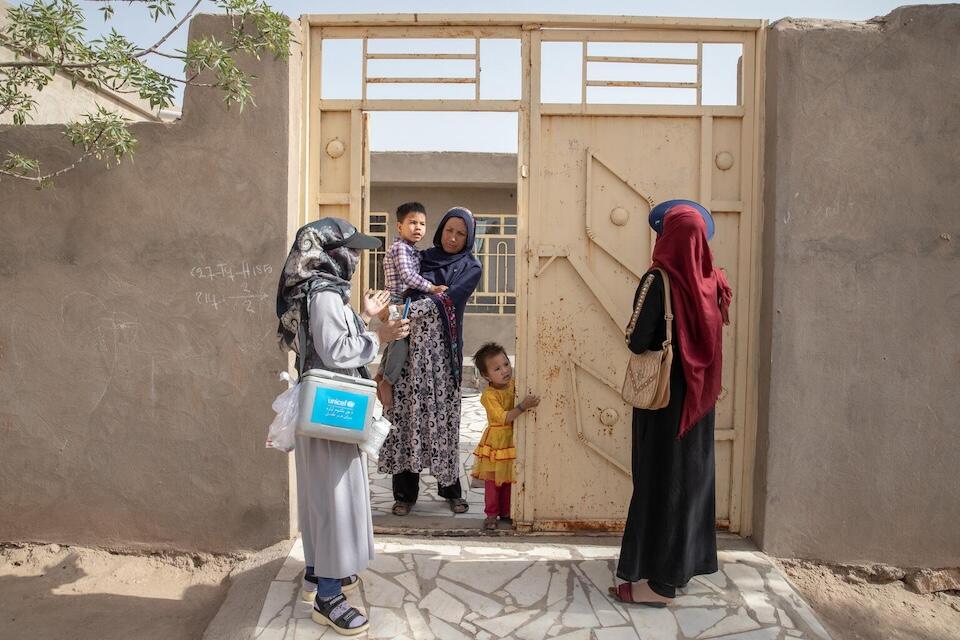
UNICEF: vaccinating over 400 million children globally every year, building trust in vaccines
UNICEF plays a critical role in polio immunization for children worldwide, helping to vaccinate 400 million children each year. A global leader in vaccine procurement, UNICEF ensures a sufficient supply to meet global needs at competitive prices.
When a polio outbreak occurs — often the result of a weak health system combined with low immunization coverage — UNICEF works with governments and other partners to carry out emergency vaccination campaigns.
UNICEF also invests in health system improvements, such as providing cold chain equipment and training health workers in cold chain managements to strengthen routine immunization programs.
Misinformation about vaccines is often a barrier. To build trust in vaccines and to motivate caregivers to vaccinate their children, UNICEF employs social and behavior change strategies. Locally-based polio workers and volunteers — especially women — play a crucial role. Female vaccinators are especially effective at increasing vaccine acceptance in places where cultural norms prevent or discourage men from entering households.
All of these efforts implemented to fight polio have helped build capacities within health systems and among health workers to respond to other public health crises, from COVID-19 to mpox.
The achievements of global efforts to eradicate polio
Since the launch of GPEI in 1988, over 3 billion children have been immunized, over 900,000 polio-related deaths have been prevented and an estimated 20 million children have been spared disability.
Two of the three types of wild poliovirus have been eradicated, and wild poliovirus remains endemic in just two countries: Afghanistan and Pakistan. UNICEF works with partners in both countries — and in several other countries that have experienced outbreaks in recent years — to improve vaccination coverage while integrating health, nutrition, education and water and sanitation services into polio campaigns.
Sharing resources across sectors is considered critical for achieving polio eradication and enhancing the health and well-being of children more broadly.
A World Polio Day call to action
There are almost 2.4 billion children in the world, and all of them need to receive multiple doses of the polio vaccine. Delivering vaccines at this scale and ensuring they reach every child everywhere is a major undertaking.
Increasing public awareness of vaccines, building trust and managing misinformation is another. UNICEF works closely with community leaders to ensure an effective, tailored approach. UNICEF also supports online campaigns, managing digital engagements in 40 countries.
The battle against polio is hardest in fragile and conflict-affected countries. Successful polio vaccination campaigns in these countries are critical to stopping further cases and protecting children who are already vulnerable. Where there is active fighting, a humanitarian pause is essential to ensure health care workers can reach children and deliver vaccines safely.
In a call to action on World Polio Day 2024, UNICEF urged governments, partners and donors to:
- prioritize vaccination of all children against polio — especially in conflict and humanitarian settings and in countries with low immunization coverage across Africa and parts of Asia
- strengthen immunization systems to ensure all children receive all essential vaccines
- protect humanitarian and health care workers delivering vaccines — and respect pauses needed for campaign success
- provide critical resources to GPEI and Gavi, the Vaccine Alliance, to quickly halt outbreaks and ensure all children are vaccinated
- elevate polio eradication on political agendas at all levels, prioritizing innovative solutions and coordinated action
“The final push is the hardest, but now is the time to act," UNICEF Executive Director Catherine Russell said. "We cannot rest until every child, in every corner of the world, is safe from polio – once and for all.”
How the climate crisis is affecting the polio fight
UNICEF and other GPEI partners are committed to addressing the impacts of the climate crisis on the initiative's activities and workforce, recognizing the need for adaptation and mitigation across the program.
One way of building climate resilience is through the use of solar energy as a more affordable, reliable source for powering vaccine refrigerators, surveillance laboratories and other critical infrastructure.
Partners have also learned how to pivot when a climate disaster strikes. When Pakistan suffered historic floods in the spring and summer of 2022, polio workers still managed to immunize 32 million children in the country.
*The Global Polio Eradication Initiative is a public-private partnership led by national governments and supported by six core partners: UNICEF, the World Health Organization (WHO), Rotary International, U.S. Centers for Disease Control and Prevention (CDC), the Bill & Melinda Gates Foundation (BMGF) and Gavi, the Vaccine Alliance.
Support global efforts to eradicate polio by immunizing every child. Donate today.
